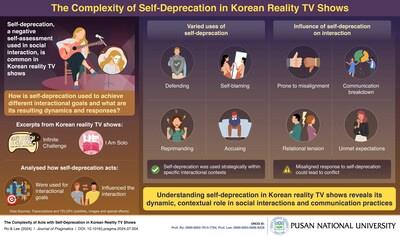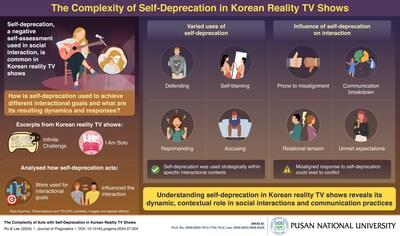
New Study From Pusan National University Uncovers The Hidden Obviousness Of Self-Deprecating Remarks In Korean Entertainment
BUSAN, South Korea, Aug. 22, 2024 /PRNewswire/ -- Self-deprecation, often involving self-criticism, plays a complex role in Korean reality TV shows, serving purposes like humor, defense, self-blame, reprimand, and accusation. Professors
Eunseok Ro and Josephine Mijin Lee's study analyzed shows such as Infinite Challenge and I Am Solo, revealing that self-deprecation's impact depends on context and cultural sensitivity. Their research offers insights into how understanding self-deprecation can enhance communication in diverse settings.

By analyzing interactions from Korean reality TV shows researchers highlights the diverse functions of self-deprecation and its complex interpretive dynamics. Their findings reveal that self-deprecation can lead to varied responses, emphasizing the need for sensitivity and context-awareness in interpreting such interactions.
Self-deprecation, a negative self-assessment used in social interaction, is prevalent in Korean reality TV shows. Traditionally, psychology views self-deprecation as indicative of low self-esteem or related psychological disorders, such as depression or eating disorders.
In a recent study by Professors Eunseok Ro from Pusan National University and Josephine Mijin Lee from Ewha Womans University, the focus shifts from a pathological view to an interactional one, revealing the complex dynamics of self-deprecation in social interactions. Their study, published online on July 22, 2024 in the Journal of Pragmatics,
suggests that self-deprecating remarks often serve broader interactional purposes. "Existing research has primarily analyzed data where self-deprecation is the central topic of the conversation. The present study contributes to an endogenous understanding of acts with self-deprecation by examining interactional episodes where the relevance of self-deprecation is momentarily suspended until other interactional exigencies are resolved," explains Profs. Ro and Lee.
The researchers analyzed three excerpts from Korean TV shows, Infinite Challenge and I Am Solo. Through detailed conversation analysis, they examined the participants' self-deprecating actions, the responses they elicited, and the interactional consequences.
In Infinite Challenge, self-deprecation was used as a defense against a false accusation, leading to a humorous interaction. The excerpt analyzed highlights how participants created humor by breaching social norms around minimizing agreement with self-criticism. Conversely, in I Am Solo, self-deprecation was used to self-blame, reprimand, and accuse to solicit an apology. Further, the excerpts from I Am Solo
demonstrated how misinterpreting self-deprecation can lead to unmet expectations, communication breakdowns, and relational tension. These examples underscore the complexity of self-deprecation in social interactions, where its meaning can vary widely depending on context. For instance, in I Am Solo, Gwangsu misinterpreted Yeongsook's self-deprecation as self-aggrandizement. When Yeongsook intended her self-criticism as an accusation, Gwangsu responded with consolation rather than an apology. Such misunderstandings can lead to emotional reactions, as seen in Yeongsook's tears. Therefore, self-deprecation should be handled carefully to avoid negative outcomes, as these examples reveal.
"Our findings reveal that self-deprecation can serve different interactional goals, such as defense, reprimand, and accusation, depending on the context. Responses to self-deprecation vary widely and can lead to misalignments, misunderstandings, and relational tension,"
observes Profs. Ro and Lee. Sensitivity to self-deprecating remarks is crucial to avoid unfortunate consequences. Sensitivity to self-deprecating remarks is crucial to avoid negative outcomes, as responses depend on the specific context and participants' goals.
In conclusion, the study illustrates the complexity of self-deprecation within conversational contexts. Self-deprecation is not merely a negative self-assessment but a strategic tool for achieving various interactional goals. The findings emphasize the importance of understanding the specific context and underlying expectations behind self-deprecating remarks to navigate interactions effectively and empathetically. By developing a sequentially sensitive approach to self-deprecation, this study deepens our understanding of this practice in social interaction.
Reference
Title of original paper:
The complexity of acts with self-deprecation in Korean reality TV shows
Journal:
Journal of Pragmatics
DOI:
href="" rel="nofollow" 1016/j.2024.07.00
About the institute
Website:
Contact:
Goon-Soo Kim
82 51 510 7928
[email protected]
SOURCE Pusan National University

Legal Disclaimer:
MENAFN provides the
information “as is” without warranty of any kind. We do not accept
any responsibility or liability for the accuracy, content, images,
videos, licenses, completeness, legality, or reliability of the information
contained in this article. If you have any complaints or copyright
issues related to this article, kindly contact the provider above.

















Comments
No comment